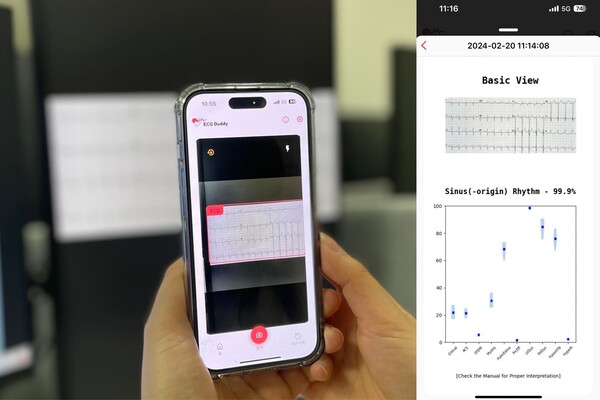Seoul National University Bundang Hospital (SNUBH) said Tuesday that its research team has developed “ECG Buddy,” an artificial intelligence (AI) application for emergency disease prediction that analyzes electrocardiogram (ECG) images to assess myocardial infarction and arrhythmia.
The research team, led by Professor Kim Joong-hee of the Department of Emergency Medicine and Professor Cho Young-jin of the Department of Cardiology, obtained certification from the Ministry of Food and Drug Safety.

Quick assessment and treatment in the emergency room are directly related to a patient's prognosis. The most serious type of myocardial infarction, ST-segment elevation myocardial infarction, the leading cause of death in middle-aged and older adults, needs to be diagnosed and treated within 10 minutes. Patients with pulmonary edema also need diuretics before they go into respiratory failure, and hyperkalemia needs calcium before serious arrhythmias occur.
Advanced tests, such as echocardiograms, blood tests, and angiograms, are required to diagnose these time-sensitive emergencies accurately. Still, it is often difficult or time-consuming to perform it in a real emergency. This puts emergency room physicians in the difficult position of choosing between sophisticated diagnostics and rapid treatment at every moment, with prognosis often dependent on the skill of the attending physician.
So, the research team developed AI software that can predict various emergency diseases by analyzing the results of an ECG test that takes less than a minute, and recently obtained a Class 2 medical device certification from the Ministry of Food and Drug Safety.

The application, called "ECG Buddy," assists in classifying 11 types of heart rhythms by simply taking a picture of the 12-lead ECG waveform area with a smartphone and outputs 10 digital biomarkers developed for severity assessment, acute myocardial infarction screening, cardiac function assessment, and hyperkalemia screening.
The team's clinical studies have shown that ECG Buddy's accuracy in diagnosing myocardial infarction and assessing hyperkalemia is higher than manual ECG analysis by trained emergency physicians or cardiologists. A clinical study was presented at the Korean Society of Emergency Medicine (KSEM) academic conference in 2023, reporting the model's superior performance in assessing cardiac function.
Although AI models for analyzing ECGs have been developed in the past, they had limitations that made them difficult to use in practice, such as the need to link AI with the hospital's medical record system or purchase new ECG measurement equipment.
In contrast, the model developed by the research team can be deployed in the field very quickly and cheaply, as it only requires an application installed on a smartphone. In particular, it is expected to play a large role as a solution to the recent local emergency medical care crisis, which has been limited in securing skilled manpower and budget.
"This artificial intelligence solution aids in making rapid judgments for administering first aid in emergency rooms, and it has high potential to be used in various areas, such as health checkups at primary medical institutions with less experienced medical staff or those unfamiliar with electrocardiogram analysis," Professor Kim said. "The recent certification by the Ministry of Food and Drug Safety will strengthen emergency medical capabilities in medically vulnerable areas."
Related articles
- Survey reveals poor usage of digital healthcare among older adults
- SNUBH professor joins IASLC's multidisciplinary committee for global lung cancer care
- Korean researchers pioneer antibiotic-free technology for skin wound healing
- President Yoon advocates medical simulation training at SNUBH for essential healthcare reforms
- SNUBH's International Healthcare Center to set global healthcare standards
- Korean researchers identify genetic composition of creativity and mental disorders
- SNUBH receives presidential citation for 'Global Healthcare Achievement'

